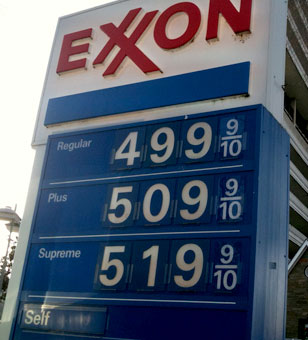Washington – Financial speculators are gambling on oil the same way they gambled on the housing market a few years ago — a frightening prospect for the fragile economy, a Democratic congressional committee was told Wednesday.
“It is similar to the gambling Wall Street did on whether or not people would pay their subprime (below-market rate) mortgages in the mortgage meltdown,” said Michael Greenberger, a law professor at the University of Maryland and a former federal regulator of financial markets. “Now they are betting on the upward direction of the price of oil.”
The housing industry collapse helped trigger the deep recession that began in late 2007 and whose effects are still felt today.
The economy is slowly recovering, Greenberger said, but it could come to a halt unless oil prices come down. Gene Guilford, president of the Independent Connecticut Petroleum Association, told lawmakers that the recent oil price run-up has cost consumers an additional $10 billion a month since mid-December.
The House of Representatives’ Democratic Steering and Policy Committee, which consists of party leaders, called the hearing to spotlight Democratic efforts to promote lower oil and gasoline prices. No Republicans were present.
Today’s routine $4-and-higher prices for a gallon of gasoline have nothing to do with conventional supply-and-demand forces, Greenberger said. He formerly directed regulation of market trading in futures contracts and derivatives for the Commodities Futures Trading Commission.
“It is excessive speculation, which is a fancy word for saying that gamblers wearing Wall Street suits have taken these markets over,” he said.
Financial speculators such as investment banks and hedge funds account for at least 65 percent of purchases of contracts for future oil deliveries, more than twice their traditional share, while buyers who intend to actually take delivery of the oil and use it, such as airlines, make up only about one-third of demand. The speculators bid up contract prices, sending oil and gasoline prices higher and reaping them huge profits. The bidding is stoked by fear of possible violence in oil-producing countries, notably Iran.
Congress has tried to pressure the Commodity Futures Trading Commission to put limits on how many contracts anyone can buy, but financial interests have stymied CFTC efforts in federal court.
Greenberger suggested several remedies, including a strong Justice Department probe. He said the threat of a serious investigation can be enough to intimidate speculators.
“If there is a real investigation, just the appearance of it will cause these cockroaches to scatter,” he said, “because the light will be turned on.”
The Energy Information Administration said Wednesday that U.S. crude oil inventories “are above the upper limit of the average range for this time of year.” Total motor gasoline inventories also remain in the upper limit of the average range. Both were as of March 30. That means supplies are plentiful; there’s no shortage pressure driving prices up.
The EIA, the statistical arm of the Energy Department, also said that total products supplied over the last four-week period have averaged about 18.2 million barrels per day, down by 4.7 percent compared with the similar period last year. Similarly, over the last four weeks, motor gasoline product supplied has averaged nearly 8.6 million barrels per day, down by 3.8 percent from the same period last year.
That inventories are up and products supplied are down suggests that producers are stockpiling supplies on concern that prices could go even higher, when they could earn a premium, even as demand for oil and its derivative products such as gasoline is actually down. Inventories are often built up ahead of the summer driving season.
The benchmark U.S. oil price fell Wednesday to $101.47 in New York, its lowest level since mid-February, but still well above where analysts believe it should be with supplies up and demand down.
(Kevin G. Hall of the Washington Bureau contributed.)
Join us in defending the truth before it’s too late
The future of independent journalism is uncertain, and the consequences of losing it are too grave to ignore. To ensure Truthout remains safe, strong, and free, we need to raise $43,000 in the next 6 days. Every dollar raised goes directly toward the costs of producing news you can trust.
Please give what you can — because by supporting us with a tax-deductible donation, you’re not just preserving a source of news, you’re helping to safeguard what’s left of our democracy.
